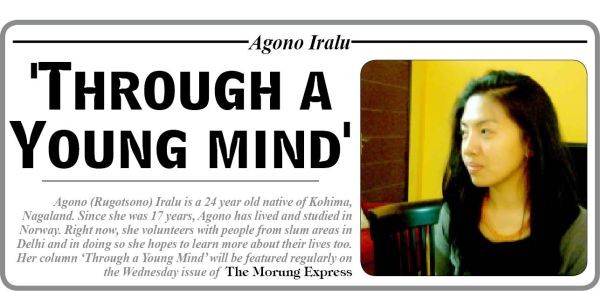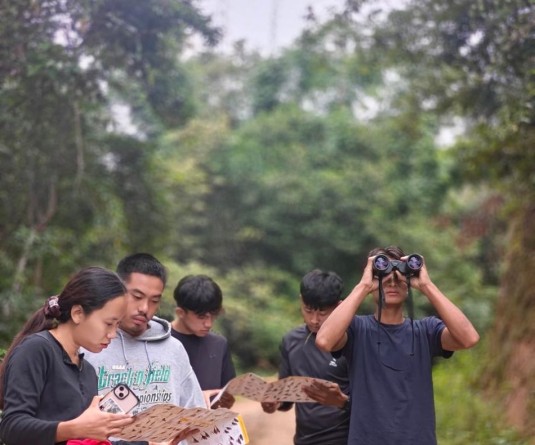
What are you? Who are you? I’m writing to you from Tuensang right now. There are moments when one feel a strong bond of kindred whether you are in Tuensang, Mon, Longleng or Kiphire. I do not really understand why we throw all that away in the name of tribe, linguistics or a mere distinction of different migration routes. Do we not know that England also consisted of wild, barbaric, pagan tribes who went on to become one of the mightiest empires of the 18th and 19th century? You see, we’re not the only people who are ‘mixed up’. Even if we came from different migration routes we have lived side by side for centuries now, does it really matter that one needs to trace their footsteps back to Borneo or to the Great Wall of China? If we did find out what would we do with that information; fragment ourselves further?
Nagas, especially among the educated ranks, are inquisitive about learning where we exactly we came from. Was it China? Was it Philippines, Borneo or from the head-hunting tribes of Taiwan? I don’t know if this is some kind of self-affirmation that we seek from the trauma of the Indo-Naga conflict, perhaps it is. Our history in the 1940’s and 50’s has been one of occupation, annihilation of our very human rights and silence of our voices In popular Hindu myth the North-east of India are referred to as the Kiratas, or the Mlechhas and it is also under this slogan that some Hindu extremists like the RSS try to swallow us all under a pan-India nation, or should I say pan-Hindu nation. We –shadows of the mist, invisible people of the north-east struggle with identities which are not quite ours and yet our own narrations disappoint in our quest to know about our own selves…..or so we like to think. Ask an ordinary Naga who tends to his pigs, works in his fields and has inhaled the fumes of a morung-fire. He will tell you a different story. We are who we are, we have never been otherwise. The Hindus may have called us Mlecchas or Ptolemy may have referred to us in 150 AD, ‘Nag’ could mean snake or Nanga naked, Naka ‘people with pierced ears’. Is it so important? We have existed as long as they have mentioned us, yet as far as we know we’ve always existed in these hills. My father and I were discussing how each Naga tribe seem to know his territory. Of course there are disputes, I am near Tobu and I can recall the tribal clashes between Changs and Konyaks over Tobu in 1987. So if we all are different tribes, languages, migration routes, physiognomy etc. etc. how did we demarcate our (tribal, village) boundaries peacefully and abide by that still? I argued that the tribes (Nagas fought village to village, wars were not solely fought tribe against tribe.) conquered land and settled, claimed it as theirs. But my father said that even when one village was defeated by the other, the victor did not take the other’s land although he became a vassal. That was a very interesting fact. Internecine, barbaric, wild head-hunters did not acquisition the defeated enemy’s land, in fact, in most cases they never encroached into the other’s land through conquest. This also perhaps brings out the strong bond to land, village, community or terrain that an average Naga experiences.
Deconstructing Colonialism (and many other etc’s)
What are the characteristics of an average, anglicized, neo-colonized Naga? Indeed a lot of things, among them a certain distance to his/her own indigenous culture and I’m left wondering whether neo-colonization was meant to benefit or to incapacitate us. In many ways we do not realize or comprehend lucidly. My grand-aunt and I had a long conversation about what indigenizing Christianity should be. In her opinion, indigenize equals accepting Christianity and living a Christ-like or Christianity-like life. Fair enough, adopting an acquired religion needs to be taken to the heart too. However, my argument delves deeper into our cultural aspects, relativity and contextualizing to our reality. My real intent of indigenizing is so we can inculcate our cultural aspects, our identity or relevance of Christianity into our context. Christianity, as such, is a more embracive and inclusive faith that transcends the Hebrews, Israel and even the 2000 years gap between then and now. But without contextualizing or the term I use, ‘indigenizing’, Christianity is like a hazy, ambiguous if not elusive understanding for most Nagas. If I may take the example, like the way Islam has acclimatized into the Indian sub-continent although not indigenous, Christianity can also be acclimatized into the Naga society likewise. From my observations nominal Christianity and a vague, distant understanding of Christianity is infused into our society where we still understand it along a puritanical Baptist Christianity that the American missionaries brought to us. Everything before that, the animist beliefs are understood as pagan or heathen and there are also a lot of conflicts between culture and religion, customs and belief. I think we could change some aspects of that.
The word ‘tribe’ has a very colonial ring to it, in the same way that ‘kilted’ and ‘non-kilted’ Nagas do. What do I find among these remote regions of Naga-land, even beyond the context of my Tenymia identity? I find relevance, I find a kindred feeling and even a sense of belonging. I would believe that the whole North-east originated from one stock and therefore we have some sort of affinity. In the Naga context, this affinity stronger and more persistent. I cannot understand why we are so insistent on being tribes, languages, physiognomies and different migration routes. I see communities, I see different migration routes, I see places, people coming together and then I see inter-relation, influence upon one another and inter-communitizing within that. We Nagas identify ourselves into villages, clans, families, individuals. The word ‘tribe’ is a foreign-induced language.
Decolonizing the Naga mind, letting him understand the uniqueness and rarity that he has inherited is an essential part of our growth.
What do the Nagas give to the world?
There is so much yet we have just underestimated ourselves so adversely too. I have never come across a people quite like us. And I have soaked a great deal of Europe or India. India; that exotic, spiritual land of spices, riches, maharajahs and Hinduism. We’re different again; what could the Nagas offer? Why don’t we start from ourselves? From Mon, from Tuensang, or Longleng or from Pongo-Phom village, from Mon village, Chingmei, Kigwera, Lungkhum, Lazami?
It is that time now that we decide who we will be –not as colonized, subjected, or oppressed people. I speak from Tuensang, I speak from Longleng, I speak from Mon, I speak from Mokokchung to a Naga public, not an Angami audience or a Tenymia. I speak to a Naga audience who are yet to define themselves.




